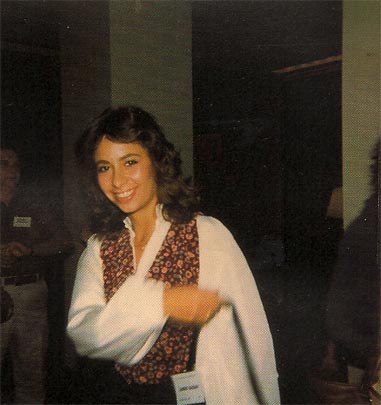ADDITIONAL PROFESSIONAL WRITINGS —On Counseling, Circa 1980
(Excerpts)
"It is in those moments when our divided selves threaten to drag each other down that a friend becomes a life saver which keeps us afloat and together" (Erik Erikson, Insight & Responsibility, 1964) There are times in everyone's life when we encounter difficulties and need someone's help. It is at those times that we encounter two issues, namely whether we have anyone to turn to and to whom do we turn. The purpose of this paper will be to elucidate my opinions on what I consider a maximally helpful person to be and how I would like to bring that person into closer proximity to people in need.
I Believe that the skilled counselor and the counseling relationship can provide a unique forum for prevention, intervention, and the facilitation of optimal development. The counselor is uniquely motivated and focused on helping the client, and the skills and training of the counselor are specifically designed for this purpose. The success of the counselor in undertaking this task is dependent on two important conditions, namely the quality of the counseling relationship and the expertise of the counselor.
The counselor needs to facilitate a good, cooperative, working relationship with the client to promote client growth. In order to do so the counselor needs to convey certain attitudes to the client such as positive regard and empathic understanding. The counselor should be appropriate, competent, and genuine. He/she should provide a good model for the client, as well as be sensitive to delicate aspects of self-revelation. Optimally, the counselor provides a safe haven for self-exploration based on trust, confidentiality, and a non-judgmental attitude. The counselor does not judge, manipulate (in the negative sense), punish or try to fulfill his or her own needs. At the same time, the counselor is cognizant of the sensible use of positive manipulation and condition setting for promoting client growth and change.

Getting ready for work, 1982
In order to establish and maintain rapport with the client the counselor needs to be alert and sensitive to the client as an individual, to the cues the client provides, and to the client's perception of the world. The counselor also must be able to convey his/her understanding to the client and communicate with the client from within the client's frame of reference. Above all, the counselor must believe in the client's potential for change, growth, and self actualization, and must respect the client's individuality. All of these contribute to the counselor's ability to fa
Concomitant with the quality of relationship the counselor's theoretical perspective and expertise influence the modality and outcome of therapy. It is my belief that the optimal perspective is an eclectic integration of theoretical systems, including a comprehensive understanding of related theories such as developmental and social-learning theories, since each theoretical system has its application in understanding and promoting client growth. Consequently, the counselor should be well versed in different approaches with an integrated overall perspective; and should have a broad training in various techniques, so that he/she will be able to tap different systems as they are useful. Furthermore, I believe it can be particularly beneficial for the counselor to have a holistic perspective, to enable him/her to treat the client as a whole person with a comprehensive approach that involves all the client's personality dimensions: mind, body, thoughts, emotions, including positive as well as negative aspects. Hence, it is very important that the counselor be flexible, open, and creative in approaching and moving with each individual client's needs.
Different approaches work best with different clients at different times. Frequently, when discussing therapeutic approaches we are confronted with a variety of what appears to be polarities and dichotomies such as; directive vs. non-directive, talking/listening vs. action or experiential techniques, insight vs. behavior change, past vs. present, process vs. content, parts vs. wholes, intrapsychic vs. interpersonal, etc. It is my belief that each and everyone of these have their place in therapy. Clearly they are effected by the particular orientation and personality of the therapist, but optimally they should be mediated according to client needs. In my opinion the truly effective counselor is versatile and flexibly able to apply a variety of therapeutic modalities and moves according to their usefulness, effectiveness and appropriateness for the particular client and his/her needs at the moment.
Having established what I believe constitutes a good helper, let us now turn to the issue of the helper's accessibility. I believe that the counseling relationship presently is only minimally accessible and far from fully utilized. First of all, the stigma associated with seeking professional help must be eliminated in order to increase its utilization and enable all people to benefit from counseling. The counseling relationship can be a highly valuable growth experience and should be available as such, regardless of whether one has emotional problems or not. Second, we must create an environment that places people who can help and who are trained to help in contact with people who need that help. What with the rapid change, mobility, fractionalization, alienation, isolation, detachment, that characterize our social system, we are rapidly reducing the accessibility of many types of helping relationships...


